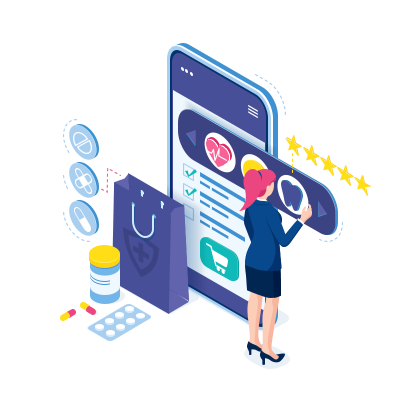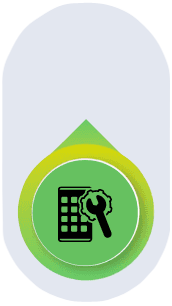Revolutionizing Healthcare with Blockchain Technology
Leverage blockchain for secure patient data, smart contracts, and transparent medical records. Improve trust, reduce fraud, and enhance healthcare efficiency with decentralized solutions.

Blockchain in Healthcare Development Services
Blockchain technology has gained a lot of momentum since its inception, largely due to its distinctive features such as consistency and transparency. These factors have made it an amazing solution to many industry problems such as supply chain, finance, banking, insurance, communications, energy, and the healthcare sector.
With the advent of technological change in the health care industry, all health facilities are looking to adopt technologies that can streamline their processes. However, as the industry deals with extremely sensitive patient information, providers need to ensure that any technology they use does not jeopardize the safety of their patient information. That’s where blockchain technology comes in. Blockchain technology can be used to benefit the health sector in many ways.
In this article, we will focus on the following aspects of using blockchain in health care:
- Patient and Security Information Management
- Genetics
- Improve communication with patient providers
- Counterfeit Drug Control
But before we understand the use cases, let’s talk briefly about the definition of blockchain in health care.
The blockchain technology ecosystem will work best for fundraising, effective drug trafficking, access to research data, emergency implants, clinical trials, human data, and epidemic prevention. Public administration in blockchain health care solutions will have a positive impact on preventing clinical errors and costly surgery. Overall, the installation of the blockchain will enrich the health care system with quality, quality standards, integrity, transparency, and cost-effectiveness.
Why Blockchain Used in Healthcare Solutions?
Blockchain infrastructure could completely change the perception of the healthcare sector among participants. Direct consultation, general costs, certified staff and facilities, high-quality drug sales, and transparency in health care processes can be helpful in the next health care system. In parts of clinical trials, physicians would not be allowed to perform this procedure by certification without the consent of the patient. This can prevent mortality and openness in health care systems.
A low-level health care system infrastructure that protects patient data with authorized access and prevents potential hacks. The healthcare sector will thrive on transparency, honesty, follow-up, disease balance, high-quality drugs, effective doctors and diagnostics, and much more with blockchain solutions!
Pay with Multiple Currencies
Blockchain health care solutions will allow fiat and digital payment transactions. This can be of great benefit to travellers and regular migrants. They do not have to panic in an emergency.
Special Developed
The Blockchain ecosystem enables executives to validate and approve a specialized niche of physicians with their certificates and knowledge. This can save time and effort for patients roaming through regular consultation.
Governance by Consensus
Specialists and members of the medical board can design compliant treatments and guidelines for health care procedures. Upon successful implementation of the consensus agreements, the guarantors will resolve the set conditions.
Real-Time Claims Settlement
In blockchain-based health care systems, patients and facilities can incur medical and medical bills in real-time. The health care network will be integrated with insurance service providers, so a claim for immediate claims will be made.
Drug Delivery and Logistics
The Blockchain ecosystem can enforce quality product contracting testing in the integrated pharma industry. This can remove counterfeit drugs from the market and promote effective drug escape from drug manufacturers to patients.
Worldwide Support Network
With a separate network, patients can access global medical support around the clock without going to hospitals for blockchain solutions. This can be good in the event of a serious heart attack and emergency.
Advantages of Using Blockchain in Healthcare Solutions

The Online healthcare sector is particularly successful in medical, research, and clinical trials in this digital age. However, the paper industry is still working on processes that lead to dishonesty, transparency, and the sale of high-quality drugs. Injecting a blockchain into the healthcare system rejuvenates the industry in terms of transparency, legitimacy, goal setting, integrity, efficiency, and encryption. Patients can successfully manage their medical history honestly in a digital ledge and access it whenever needed by maintaining confidentiality.
Doctors and patients can connect to the network used in case of emergency calls without delay. Blockchain health care applications can encourage more revenue, and visitors can use this feature to a great extent. A comprehensive and transparent healthcare system can standardize treatment rates and procedures for network companies.
Real Blockchain Use Cases in Healthcare System
Scheduled Payments
With consensus guidelines, health facilities will never overcharge patients and demand medical and drug bills.
Employee Management
Everyone working in the health sector will be assured of specific guidelines to ensure a thorough knowledge of disease strategies and to reduce clinical errors.
International Network
Patients can seek funding around the world to find costly treatment. There will be no links as the blockchain improves P2P transactions.
Borderless Services
Federations can easily collect public health data with accurate statistics as all blockchain network data is verified by validators.
Tokenization
The natural state of health care can mark its assets and reward researchers, patients, and practitioners for their outstanding performance in the field.
Trustable Records
Blockchain healthcare solutions can effectively manage a patient's health history without leaving diagnostic reports or other supporting documentation.
Blockchain-Based Healthcare Products & Solutions
Blockchain technology is drastically reshaping the healthcare industry by providing security, transparency, and interoperability for data. The following is a brief introduction to several leading blockchain healthcare products revolutionizing the sector:
Blockchain-Based Electronic Health Records (EHRs)
- Secure & Tamper-Proof – Here, the patient's records are kept on an unbroken blockchain ledger.
- Interoperability – The ability of hospitals, clinics, and insurance companies to share data unhindered is achieved.
- Decentralized Control – The patient grants/restricts access to his/her medical data.
Smart Contract-Based Health Insurance
- Automated Claims Processing – Minimizes insurance fraud, expediting an insurance claim.
- Transparent & Trustworthy –Removes the intermediaries, ensuring equal enforcement of the policy.
- Real-Time Policy Validation –Smart contracts that check the eligibility of a policy instantly.
Blockchain for Drug Supply Chain Management
- End-to-End Drug Tracking – Ensures drugs are counterfeit-free and authentic.
- Live Stock Management – Reduces shortage of stock for dispensing.
- Compliance with Regulations – Keeping transparent records for various authorities.
Decentralized Telemedicine & Health Consultations
- Patient and Doctor Secure Communications – Protects communications and medical details.
- Blockchain-Based Payments – Completely transparent and seamless.
- Anonymized Health Data – Gives safety in virtual healthcare services.
Blockchain for Clinical Trials & Research
- Data Integrity and Transparency – Ensures there is no manipulation of the results from clinical types.
- Patient Consent Management – Consents are provided by smart contracts for ethical approvals.
- Decentralized Research Collaboration – Debate in studies, enabling global participation.
Tokenized Healthcare Systems & Incentive Programs
- Reward Patients for Healthy Behavior – Gamifies fitness and wellness activities.
- Decentralized Health Token Payments – Enables payments to be made for services using crypto tokens.
- Encouraging Data Sharing for Research – This allows patients to securely monetize their health data.
Let’s Build a New Decentralized Future Together – Meet our CTO Now!
Our Development Approach

Strategy






Analysis
and
Planning

UI UX
Designing

App
Development

Testing

Deployment
and
Support



Analysis
and
Planning


UI UX
Designing


App
Development


Testing


Deployment
and
Support
Our Technology Development Stack



















Get Estimate
Let’s create something extraordinary. Connect with Blockchain Technologies today!
Our Locations
